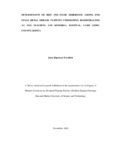| dc.contributor.author | Toroitich, John Kipserem | |
| dc.date.accessioned | 2020-12-11T08:13:34Z | |
| dc.date.available | 2020-12-11T08:13:34Z | |
| dc.date.issued | 2020-11-12 | |
| dc.identifier.uri | http://r-library.mmust.ac.ke/123456789/1438 | |
| dc.description.abstract | End Stage Renal Disease (ESRD) is aglobalpublic health problem.Moi Teaching and Referral Hospital (MTRH) has over 200 hemodialysis patients with nearly 2/3rd struggling with dietary and fluid adherence.This study assessed determinants of diet and fluid adherence among ERSD undergoing hemodialysis atMTRH.A quantitative cross-sectional study design was conducted from 1stAprilto 16thMay2018.A sample size of 145participants whowere on HD twice weekly wereconveniently recruitedusing Fisher’s formula. End stage renal disease adherence questionnaire (ESRD-AQ)was used for data collection.Chi-square (χ2) was used to test statistical significance. Frequency tables and bar graphs were used for data presentation. SPSS version 22.0 was used for data analysis. The study revealed that, low level of knowledge on fluid adherence was marginally associated with dietary adherenceand fluid adherence. Most participants (71.9%)who were aware of limitingfluid intake to keep their body healthy practiced fluid intake (p=0.07).A smaller proportion of participants (62.5%) adhered to dietif they practiced fluid restrictions all the time (p=0.003). (61.3%)practiced dietary restriction if they receiveda health talk every dialysis treatment or every week (p <0.0001). Majority (80%) who had no difficultyin keeping dietary recommendations practiced fluid adherence (p=0.003).Patientswhoreceivedsocial support practiceddietary adherencewithsignificantly higher mean of 5.6 (95% CI = 5.5 –5.6).Most patients (83.3%) who used bus for transport practiceddietary adherence (p=0.02).Majority (84.6%) who earned less than KSH. 30,000 observed dietary guidelines(p=0.006): A smaller proportion (68.8%) who claimed treatment cost was expensiveadhered to diet (p=0.007): Those who accessed material support that helps in dietary adherence, a smaller proportion(69.8%) adhered to diet (p=0.003): Those who claimed lack of transport was the main reason for missing dialysis treatment, a significantly smaller proportion (44%) adhered to fluid restriction (p=0.01).The study concluded that, low level of knowledge on fluid adherence had positive outcome on dietary adherence and negative outcome on fluid adherence.Limiting fluidsintake and taking proper diet positively influenced fluid adherence.Following fluid restrictions all the time and health education conducted by renal staff on importance of following a proper diet didnot translate into dietary adherence.Patients who practiced dietary recommendations were also fluid adherent.Social support is important towards dietaryand fluid adherence. Use of bus for transport and income of less than KSh. 30,000 wereassociated with dietary adherence. Lack of transport as a reason for missing dialysis wasnegatively associated with fluid adherence. Renalpatientson HD should be educatedon the importance of limiting fluidsand taking proper diet.Social supportshould be offered to HD patients to boost dietary and fluid adherence. The national and county governments should decentralize management of hemodialysis patients to sub-county hospitals to minimize adherence challenges. | en_US |
| dc.description.sponsorship | MMUST | en_US |
| dc.language.iso | en | en_US |
| dc.publisher | MMUST | en_US |
| dc.subject | Determinants, Diet, Fluid Adherence, Hemodialysis, | en_US |
| dc.title | DETERMINANTS OF DIET AND FLUID ADHERENCEAMONG END STAGE RENAL DISEASE PATIENTS UNDERGOING HAEMODIALYSIS AT MOI TEACHINGAND REFERRAL HOSPITAL, UASIN GISHU COUNTY, KENYA | en_US |
| dc.type | Thesis | en_US |

